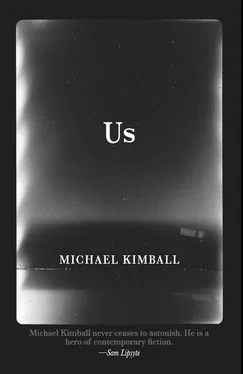I have visited so many hospitals and nursing homes and funeral homes. I have watched dying people sleep. I have watched them try to talk and try to eat. I have fed them food and read them books. I have gotten them water and given them their pills. I have listened to how hard it was for them to breathe. I have covered them up with blankets and turned their pillows over to the cool side. I have helped them into and out of their beds and into and out of bathrooms. I have gone to get the doctor or the nurse for them.
All of it helped for a little while, but almost all of them died anyway. My Grandmother and Grandfather Oliver both died from something to do with the heart — either failure or disease — and I keep thinking about how she died before he did. She had broken her hip and her ankle, and then there was a pain inside her chest that stayed there and made it hard for her to breathe.
I keep trying to imagine what my grandfather must have been thinking while my grandmother was in and out of the hospital. They both knew that she was going to die soon. They both knew that they had a finite amount of time left with each other after they had been together for so many years. I keep thinking about those last days that they had together, what they must have thought and felt and did, and how those days might have been different from all the other days that they had already lived together.
I keep thinking about how after my grandmother died, that my grandfather started to die too, and that it was so hard for him to breathe in those last few months that he was alive without her. I keep thinking about my wife and how one day one of us is going to die and that the other one of us will still be alive too.
Some of the People Who Came Home from the Hospital
My Uncle Johnny, my Grandmother Kimball, my Grandfather Kimball, and my Grandfather Oliver — they all died inside a hospital. My Grandmother Oliver came home from the hospital for one last time and then died at home a few months after that. My Aunt Anita got out of the hospital and died in her canopy bed a few months after she came home for her last time too. My Aunt Billie got out of the hospital and lived at home for years, even though she never got any better or well. She got worse until none of us could take care of her anymore, and then she lived for so many more years in a nursing home and then another year more in another nursing home before she died in her single bed there.
Nobody ever really got any better. Everybody died inside a hospital or came home from the hospital and died in their bed.
But sometimes there was some kind of hope when people came home from the hospital, that even though they couldn’t lift anything up or walk around, that even though they couldn’t breathe without an oxygen tank and an oxygen mask or even feed themselves, that they might somehow get better and then stay alive for some long time after that.
We believed that this could happen, but it never did, not for anybody in my family or anybody else that I ever knew. They were all going to get worse in their own bed and among their own things and their own family and somehow dying that way wasn’t supposed to be as bad as dying in the hospital in a bed that wasn’t theirs.
But the dying always seemed just as bad or worse for them. We could do so much less for them than could be done for them inside a hospital. There didn’t seem to be any more comfort in particular sheets or pillows or certain blankets. There didn’t seem to be any reassurance in a familiar view through a bedroom window. So their coming home from the hospital must have been for us, the ones of us who weren’t dying yet. It must have made us not hurt so much to be able to do the few small things that we could do for them.
But coming home from the hospital also makes me think of my wife after she came home from the hospital after a serious ear surgery. She wasn’t going to die, but we wouldn’t know if the surgery were successful and if she would hear again until weeks after she had come back home.
There were so many things that could have gone wrong during that recovery period. A little bone inside her ear had been replaced with a tiny metal rod that could have been dislodged if there were any quick movement or any jarring of her head.
The ear surgery also left her equilibrium off. She couldn’t sit down or sit up or stand up without me helping her. She could only lie down in bed or on the couch for those first two weeks of her recovery, and then she could sit up a little in a chair after that. She couldn’t move or even talk very fast. It hurt her ear for her to move her jaw. She could only eat oatmeal and jello and bananas and toast and she could only drink through a straw. She couldn’t talk on the telephone. She could only walk at a shuffle and only with me beside her or behind her and holding onto her and holding her head steady so that it wouldn’t begin to spin.
I brought her food and things to drink and I changed her ear dressings for her. I pulled bloody cotton balls out of her ear and then used tweezers to pick off the little strands of cotton that had attached to her ear with dried blood. I dropped antibiotic drops into her ear canal and dabbed an antibiotic salve onto the cut below her ear. I pushed clean cotton balls back into her ear, but only far enough so that the blood wouldn’t run out of her ear when she was sitting up.
She slept in our bed by herself and I stayed far enough away so that I would not bother her when she could sleep — even though she still couldn’t really hear — but near enough to her so that I could hear her if she woke up or needed anything or needed me.
But we got to where she could take a bath by herself and then I would help her towel dry and get dressed. She wore clothes that she could pull up her legs or button up around her front so that she didn’t have to pull anything off over her head. She started to walk back and forth to the bathroom without me holding onto her. There were enough things for her to hold onto along the way there — walls, chairs, doorways, the edge of the bed.
It was weeks later that we were able to sit down at the dinner table again and eat a slow dinner together. She cut her food with a slow knife and moved a slow fork up to her mouth. She opened her mouth and chewed slowly too. But eating that dinner was the first thing that we had done together again in the way that we had always done things together, even if I did have to help her back to bed after we were done.
We knew that she wasn’t going to die from her ear surgery and that she was probably going to get her hearing back. She began to hear sounds that had a low pitch — the hum of the refrigerator, the tumble of the dryer, the cycles of the dishwasher, the bass line of a song that she had always liked but never fully heard before.
But we also knew that she was going to die sometime, some years from then, or that I was going to, and that it might be something like all of that — one of us waiting in the waiting room while the other one of us was in the operating room, both of us in the hospital room with one of us waiting for the other one of us to wake up, one of us helping the other one into our car so that we could drive back home, one of us helping the other one sit up or stand up or walk, one of us helping the other one into and out of the bathroom, one of us changing the bandages on the other one and cleaning the blood up with a washcloth, both of us trying to slow that dying down.
Her First Morning Back at Home
We woke up for her first morning back at home and we were both afraid. We looked at each other and looked around the room. We were still old, but neither one of us had died during the night yet. But neither one of us was too sure where we were either. We weren’t too used to our bed and our bedroom anymore. There weren’t any machines or IVs around our bed. There weren’t any doctors or any nurses going into and out of our bedroom. There wasn’t anybody else dying in another bed and there wasn’t anybody else to help us get up or get out of our bed either.
Читать дальше












